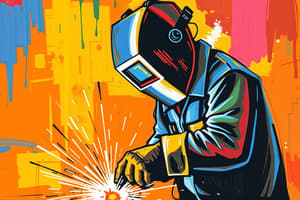Podcast
Questions and Answers
What is an auto-darkening helmet?
What is an auto-darkening helmet?
- A traditional welding helmet with no special features.
- A helmet used exclusively for MIG welding.
- A helmet that is only used for cutting.
- A helmet that eliminates welding mask visibility problems. (correct)
What is a bead in welding?
What is a bead in welding?
A deposit of filler metal from a single welding pass.
What is brazing?
What is brazing?
A process for joining similar or dissimilar metals using a filler metal without melting the base metals.
What is a butt joint in welding?
What is a butt joint in welding?
What does 'fit up' refer to in welding?
What does 'fit up' refer to in welding?
What is the duty cycle of a welding machine?
What is the duty cycle of a welding machine?
A welding process that uses a filler material in rod form and does not use a continuous wire feed is called _______.
A welding process that uses a filler material in rod form and does not use a continuous wire feed is called _______.
What is penetration in welding?
What is penetration in welding?
What is the purpose of a nozzle in welding?
What is the purpose of a nozzle in welding?
What is a plug weld?
What is a plug weld?
Study Notes
Welding and Cutting Vocabulary
-
Auto-darkening helmet: Enhances visibility by remaining clear until the welding arc is struck, eliminating visibility issues.
-
Bead: Refers to a deposit of filler metal created from a single welding pass.
-
Brazing: A method for joining metals using a filler metal without melting the base materials, allowing for the combination of similar or dissimilar metals.
-
Butt joint: A joint configuration where the gap between two panels equals the thickness of the panels themselves.
-
Butt joint with an insert: Features panels aligned edge-to-edge with another panel inserted for support.
-
Contact tube: A vital component in MIG welding that connects the welding gun to the wire, ensuring good electrical conductivity.
-
Continuous weld: Characterized by an uninterrupted weld bead, providing consistency in the join.
-
Duty cycle: Indicates the operational time of a welding machine over a 10-minute period at a specific heat setting, expressed as a percentage.
-
Electrode extension (stickout): The length of the welding wire that extends beyond the contact tube of the welding gun.
-
Fit up: Requires tight fitting of lap welded panels with no gaps to ensure a proper weld.
-
Flux-cored arc welding: A type of welding process that utilizes wire-feed without conventional shielding gas.
-
Flux colored wire: A hollow wire that contains a flux core, used in welding applications.
-
Gun orientation: Refers to the angle at which the welding gun is held relative to the workpiece, affecting the quality of the weld.
-
Lap joint: Involves the bonding of one metal panel over another, providing a strong connection.
-
Melt through: Occurs when excess heat from welding melts the base metal, creating unintended holes.
-
Metal inert gas welding (MIG): A process that joins metals using an electric arc for heating and fusing.
-
Nozzle: Directs the flow of shielding gas around the welding wire, essential for protecting the weld area.
-
Penetration: The depth to which the base metal is melted during the welding process, critical for weld strength.
-
Plug welds: Created through a hole in one lapped metal piece over another, used to replicate factory-style spot welds.
-
Push-pull wire feeder: Also called a spool gun, it incorporates a motor in the gun for pulling wire while drive rollers push through the machine.
-
Resistance welding: Involves using electrical resistance to generate heat for melting metal panels together.
-
Rosebud tip: Attachments for acetylene torches, used primarily for heating steel with a diffusing flame.
-
Shade: A glass lens in welding helmets that protects from harmful infrared and ultraviolet light.
-
Skip welding: A welding technique involving strategic placement of welds to create a continuous bead after filling initial gaps.
-
Slag: The nonmetallic residue formed on top of molten metal during welding, which must be removed for clear joints.
-
Spatter: Residual molten metal projections that occur during the welding process, which can affect the surrounding areas.
-
Spot weld: A weld created by clamping two metal panels together and applying heat from two electrodes.
-
Stick out: Same as electrode extension; it defines how much wire is extended from the welding gun's contact tube.
-
Stitch weld: A series of short, continuous welds about 3/4 inch long, used for joining sheets of metal.
-
Temperature crayon: A tool used to measure temperature which melts at a designated temperature, indicating heat levels.
-
TIG welding: Stands for Tungsten Inert Gas Welding, where a non-consumable tungsten electrode is used, providing precision in the welding process.
-
Travel direction: The path in which the welding gun is moved to create the weld, influencing the weld quality.
-
Travel speed: Refers to the speed at which the welding gun is moved during the welding operation.
-
Tungsten inert gas welding: Distinct from wire-feed methods due to the use of a hand-fed rod as consumable filler material.
-
Weld bonding: A technique combining adhesive with squeeze-type resistance spot welding for enhanced joint strength.
-
Weld nugget: The small area where metals are fused together during the welding process, vital for joint integrity.
-
Weld puddle: The molten metal created during welding, essential for successful joins.
-
Weld-through primer: A zinc-rich coating applied to overlapped panels before welding, providing protection against corrosion.
Studying That Suits You
Use AI to generate personalized quizzes and flashcards to suit your learning preferences.
Description
Test your knowledge of important welding and cutting terms with these vocabulary flashcards. Each card features a key term along with its definition, helping you to become familiar with essential concepts in the field. Perfect for students and professionals alike!




